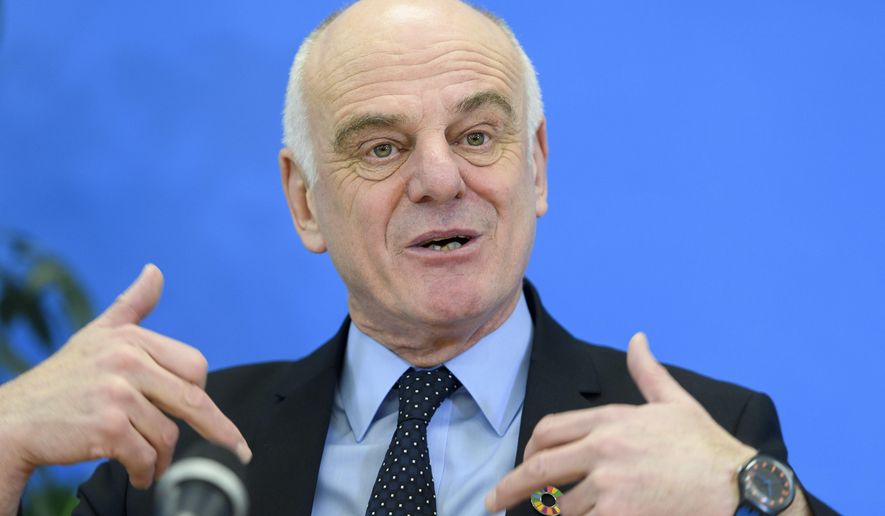A leading World Health Organization official has urged governments to stop using lockdowns as their primary method of fighting the novel coronavirus pandemic, citing the devastating economic and public-health consequences.
Dr. David Nabarro, the organization’s special envoy for COVID-19, said in a Friday interview on British television that “we in the World Health Organization do not advocate lockdowns as the primary means of control of this virus.”
He said the lockdowns may result in a doubling of world poverty and “at least a doubling of child malnutrition because children are not getting meals at school, and their parents in poor families are not able to afford it.”
“This is a terrible, ghastly global catastrophe, actually, and so we really do appeal to all world leaders: Stop using lockdown as your primary control method,” Dr. Nabarro told [U.K.] Spectator TV’s Andrew Neil. “Develop better systems for doing it. Work together and learn from each other, but remember, lockdowns just have one consequence that you must never ever belittle, and that is making poor people an awful lot poorer.”
WATCH: Dr David Nabarro, the WHO’s Special Envoy on Covid-19, tells Andrew Neil: ’We really do appeal to all world leaders: stop using lockdown as your primary control method’. Watch the full interview here: https://t.co/XLdaedsKVS #SpectatorTV @afneil | @davidnabarro pic.twitter.com/1M4xf3VnXQ
— The Spectator (@spectator) October 9, 2020
His message comes with thousands of other international experts calling for an end to the pandemic lockdowns in the Great Barrington Declaration, which had gathered as of Monday morning signatures from nearly 7,000 scientists and 15,000 medical practitioners.
“As infectious disease epidemiologists and public health scientists, we have grave concerns about the damaging physical and mental health impacts of the prevailing COVID-19 policies, and recommend an approach we call Focused Protection,” says the Great Barrington petition. “Current lockdown policies are producing devastating effects on short and long-term public health.”
The document, developed in Great Barrington, Massachusetts, was spearheaded by Harvard professor of medicine Dr. Martin Kulldorf; Oxford epidemiologist Dr. Sunetra Gupta, and Stanford Medical School professor Dr. Jay Bhattacharya.
“Herd immunity is not a political strategy it’s a biological fact” Prof. Jay Bhattacharya. #signupstartliving pic.twitter.com/SxKxOjDZNQ
— Great Barrington Declaration (unofficial) (@gbdeclaration) October 7, 2020
Other scientists have criticized the Great Barrington proposal, which calls for safeguarding the elderly and those at risk of death while allowing others to live normally and “build up immunity through natural infection.”
“This declaration prioritises just one aspect of a sensible strategy — protecting the vulnerable — and suggests we can safely build up ’herd immunity’ in the rest of the population. This is wishful thinking,” said Dr. Rupert Beale of the Francis Crick Institute. “It is not possible to fully identify vulnerable individuals, and it is not possible to fully isolate them.”
BREAKING: WHO reverses position on LOCKDOWNS, condemning them and speaking positively about the Great Barrington Declaration.
— James Todaro, MD (@JamesTodaroMD) October 11, 2020
“Lockdowns just have one consequence that you must never ever belittle, and that is making poor people an awful lot poorer.”https://t.co/tK1aSGRI2G
Dr. Nabarro said that the lockdowns may have been justified at the beginning of the coronavirus crisis, but no longer.
“The only time we believe a lockdown is justified is to buy you time to reorganize, regroup, rebalance your resources, protect your health workers who are exhausted,” Dr. Nabarro said. “But by and large, we’d rather not do it.”
He pointed to the damage done to tourism- and agriculture-based economies.
“Just look at what’s happened to the tourism industry, for example, in the Caribbean or in the Pacific because people aren’t taking their holidays,” Dr. Nabarro said. “Look what’s happened to small holder farmers all over the world because their markets have got dented.”
Shutdown orders in the United States vary from state to state. California, Hawaii and Massachusetts have the most restrictions, while South Dakota, Idaho and Utah have the fewest, according to an Oct. 6 survey by WalletHub.
More than 1 million people worldwide have died of COVID-19, which has infected nearly 38 million people worldwide, according to Worldometer.
• Valerie Richardson can be reached at vrichardson@washingtontimes.com.




Please read our comment policy before commenting.